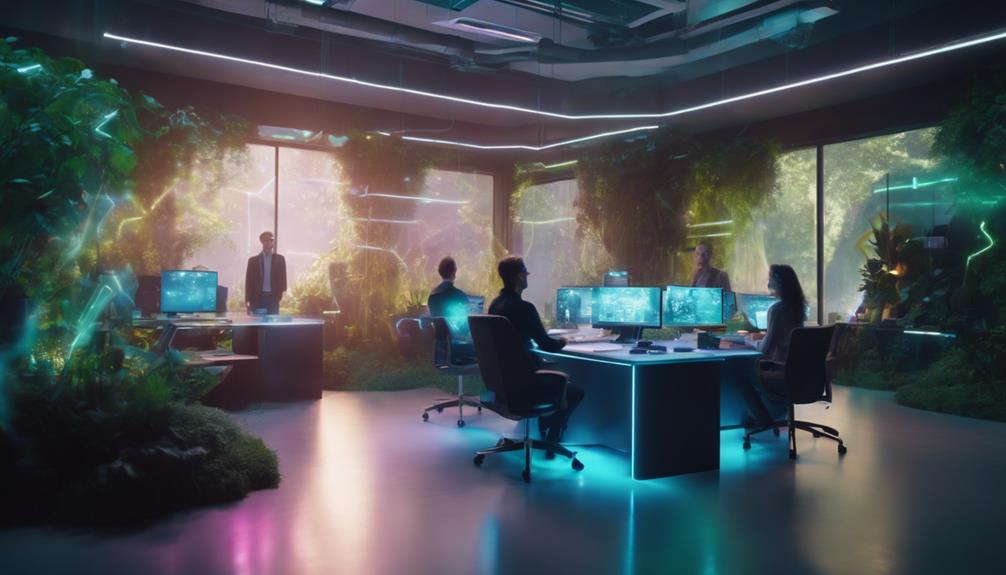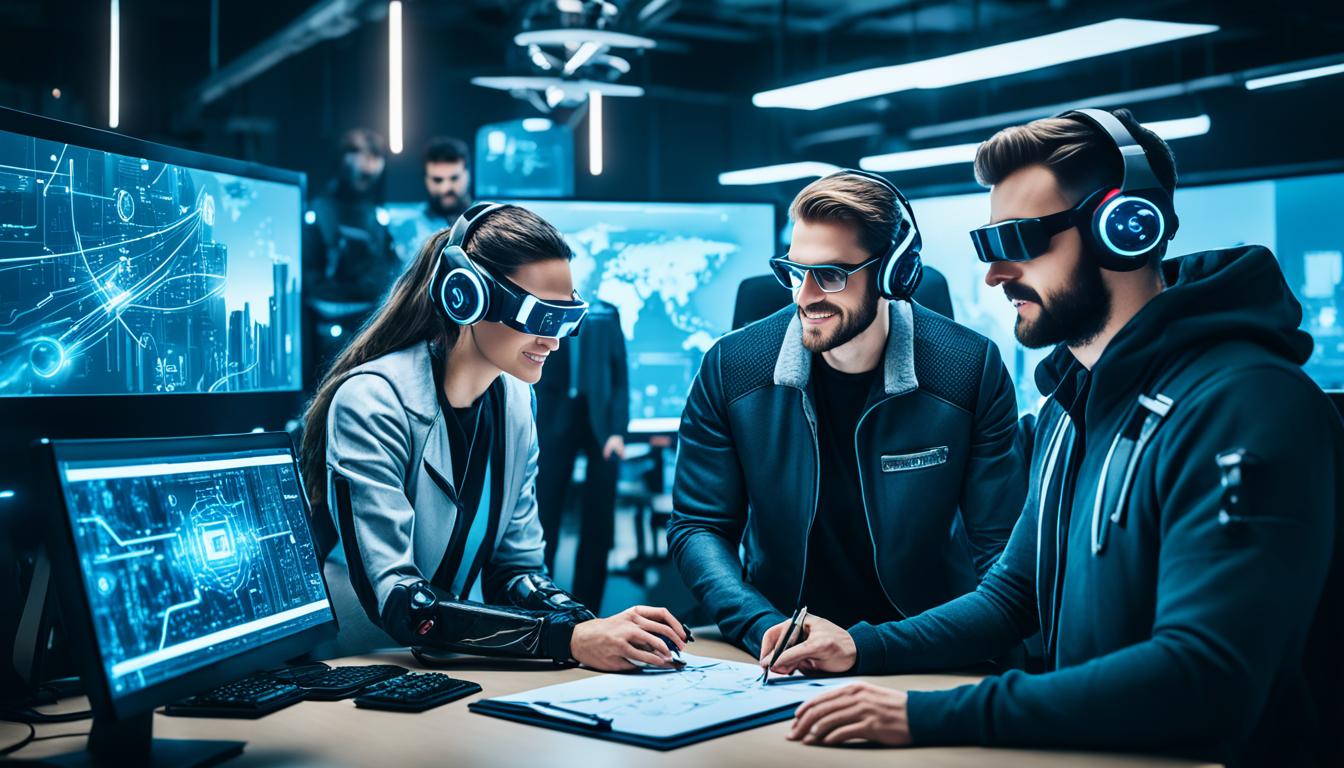You rely on skills like empathy, creativity, and emotional intelligence that AI simply can’t replicate. These qualities help you connect genuinely with others, build trust, and navigate complex emotional situations. Your ability to interpret subtle cues, innovate, and adapt sets you apart from machines. As automation grows, these human traits become even more valuable. If you want to understand which roles truly need these skills, keep exploring what makes humans irreplaceable in the workforce.
Key Takeaways
- Emotional intelligence enables humans to read subtle emotional cues and build trust, which AI cannot replicate effectively.
- Genuine empathy allows for meaningful connections in healthcare, education, and customer service roles.
- Human creativity and intuition drive innovation, problem-solving, and adaptability beyond AI’s algorithmic capabilities.
- The ability to respond with nuance and sensitivity to complex human experiences remains a uniquely human skill.
- Traits like empathy, social navigation, and emotional understanding ensure lasting value in roles AI cannot replace.

While AI continues to revolutionize many industries, there are certain jobs it can’t replace because they rely on uniquely human qualities. Among these qualities, emotional intelligence stands out as a essential skill that AI struggles to mimic. When you’re working with people—whether in healthcare, education, or customer service—your ability to read emotions, empathize, and respond appropriately creates a connection that no algorithm can replicate. AI can analyze data and even simulate responses, but it doesn’t truly understand feelings or the nuances of human experience. Your capacity to sense subtle cues, offer comfort, or adjust your tone based on a person’s emotional state remains a distinctly human trait. This skill becomes especially indispensable in roles where building trust and rapport can determine success or failure. As automation handles more routine tasks, your emotional intelligence becomes a key differentiator that keeps you irreplaceable.
Creative thinking is another area where humans hold an advantage over AI. While machines excel at processing vast amounts of data and generating solutions based on algorithms, they lack the innate ability to think outside the box in the way you can. Your creative thinking enables you to approach problems from unique angles, develop innovative ideas, and adapt to unpredictable circumstances. This flexibility is essential in fields like design, marketing, and leadership, where originality and intuition often lead to breakthroughs. AI may suggest options based on past patterns, but it cannot match your ability to envision new possibilities or imagine scenarios beyond existing data. Your creativity allows you to craft compelling stories, develop original strategies, and inspire others—tasks that require human insight and imagination.
These skills—emotional intelligence and creative thinking—are deeply intertwined with your human nature. They involve empathy, intuition, and the ability to navigate complex social environments, qualities that AI cannot genuinely possess. As technology advances, your ability to connect on an emotional level and generate innovative ideas will continue to be invaluable. You’re not just performing tasks; you’re engaging with others on a level that fosters trust, understanding, and inspiration. That’s why, even in an increasingly automated world, these traits ensure that your role remains irreplaceable. Your uniquely human qualities give you the power to adapt, innovate, and connect—traits that no machine can truly imitate or replace.
Frequently Asked Questions
How Do Emotional Intelligence Skills Influence Job Security?
Your emotional intelligence skills, like emotional empathy and strong interpersonal skills, notably boost your job security. When you show genuine understanding and connect well with others, you become invaluable in teamwork and leadership. These skills help you navigate conflicts, build trust, and adapt to change. Because AI can’t replicate authentic human empathy, your ability to relate emotionally ensures you’re essential and resilient in your role, safeguarding your position in the workplace.
Can Creativity Be Fully Automated in the Future?
They say, “The pen is mightier than the sword,” and that rings true for creativity. While AI has made strides, it can’t fully automate creativity because of its limitations in understanding nuanced human experiences. Your creative intuition goes beyond algorithms, allowing for original ideas and emotional depth. So, no, creativity won’t be fully automated in the future, because true innovation relies on human insight and imagination that AI can’t replicate.
What Roles Require Complex Ethical Decision-Making?
You handle roles involving complex ethical decision-making when faced with ethical dilemmas that require deep moral reasoning. In these situations, you must evaluate conflicting values, consider societal impacts, and make judgments that reflect human empathy and intuition. Such roles demand nuanced understanding of morality, which AI cannot imitate. Your ability to navigate moral grey areas ensures ethical standards are upheld, reinforcing the importance of human judgment in sensitive professions like healthcare, law, and leadership.
How Important Is Cultural Awareness in Human-Centric Jobs?
You’ll find that cultural awareness is truly essential in human-centric jobs. By embracing cultural sensitivity, you can foster trust and understanding across diverse backgrounds. Cross-cultural communication becomes your secret weapon, allowing you to navigate differences gracefully. This skill helps you connect authentically, resolve misunderstandings, and build strong relationships. In today’s globalized world, your ability to adapt and respect various cultural perspectives considerably enhances your effectiveness and personal growth in any role.
Are There Emerging Skills That AI Cannot Learn?
Yes, emerging skills like AI empathy and intuitive reasoning are beyond AI’s capabilities. You can develop these uniquely human skills by understanding emotions deeply and making nuanced decisions based on context. While AI can simulate empathy, it can’t genuinely feel or intuitively reason as humans do. By honing these skills, you stay irreplaceable, ensuring your role remains essential in areas requiring genuine human connection and complex judgment.
Conclusion
While AI continues to advance, certain skills remain uniquely human. Your empathy, creativity, and critical thinking can’t be replaced by machines. In fact, a recent study found that 85% of jobs require social and emotional skills—areas where humans excel. So, embrace these qualities; they’re your greatest assets in an AI-driven world. Keep honing your interpersonal skills, and you’ll stay indispensable no matter how smart technology gets.








